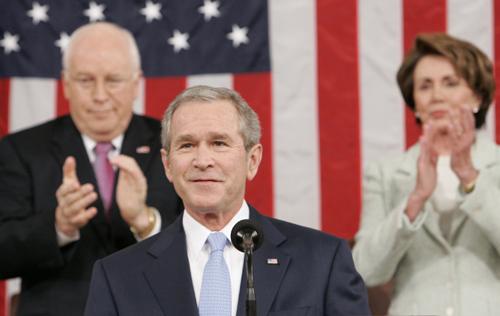Bush asks to send more troops

President Bush smiles as he arrives to deliver his annual State of the Union address to a joint session of Congress as Vice President Richard Cheney, left, and House Speaker Nancy Pelosi of Calif. applaud, on Capitol Hill in Washington, Tuesday, Jan. 23, Associated Press
Jan 24, 2007
Last updated on May 12, 2016 at 07:13 a.m.
WASHINGTON – Sen. Barack Obama, an opponent of the United States invading Iraq even months before it even happened, expressed doubts that sending even more U.S. troops there would accomplish much, if anything.
“Most Americans believe that escalation will not bring the war in Iraq to a responsible end, and that’s why I’ve proposed not just a troop cap, but a phased redeployment that will start bringing our troops home,” the Illinois Democrat said in a statement following President Bush’s State of the Union address.
Bush asked Congress Tuesday night to embrace his unpopular plan to send more U.S. troops to Iraq, saying it represents the best hope in a war America must not lose. He has proposed sending an additional 21,500 American troops to Iraq in an effort to quell fighting there that threatens the survival of the government in Baghdad.
“Give it a chance to work,” Bush said during his speech.
Get The Daily Illini in your inbox!
Known for his bipartisan tendencies, Obama praised the president but with a strong cautionary note.
“The president offered some serious proposals tonight on two issues, energy and health care, that we all agree must be addressed; I’m glad he did and I think it’s important to respond in a constructive way,” he said.
Obama, who has formed an exploratory committee for a potential run for the White House, is expected to announce on Feb. 10 that he will be a candidate for the presidential election in 2008.
He warned that the 2006 election proved that “politics-by-slogan” and “poll-tested sound bites” will not cut it with the American people anymore.
“That’s why the real test of leadership is not what the president said to Congress tonight, but how he works with Congress to find real solutions to the problems we face,” he added.
The freshman senator also made it clear he had little use for Bush’s heavy reliance on private insurance to solve the nation’s health care problems.
“Most Americans believe that the biggest domestic challenge facing the country is the high cost of health care, and that’s why incremental plans that do nothing to bring down costs or guarantee coverage are simply no longer sufficient,” he said.
Earlier, Sen. Dick Durbin, who voted against going to war in Iraq in 2002 and has remained a steady foe of U.S. military involvement there, played host Tuesday to two wounded servicemen, his personal guests for the State of the Union address.
The men, Marine Staff Sgt. Wade Cobar of Schaumburg, Ill., and Army Staff Sgt. Eric Sundell of Patoka, Ill., did not offer criticism of the war, but praised the care they received at military hospitals and the kindness of Americans who sent them care packages to Iraq.





